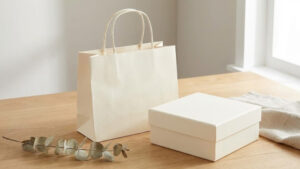Last Updated on August 29, 2025 by Packoi Team
Edible packaging is a unique solution that offers you an eco-friendly alternative to traditional food packaging materials. Many companies using edible packaging set themselves apart in the competitive market by showcasing their commitment to sustainability.
The edible packaging industry is projected to reach a market value of 1.1 billion USD by 2028, driven by consumer satisfaction and environmental benefits. This article explores edible packaging’s benefits, applications, and why it’s a perfect choice for your business.
What Is Edible Packaging and How Is It Made?
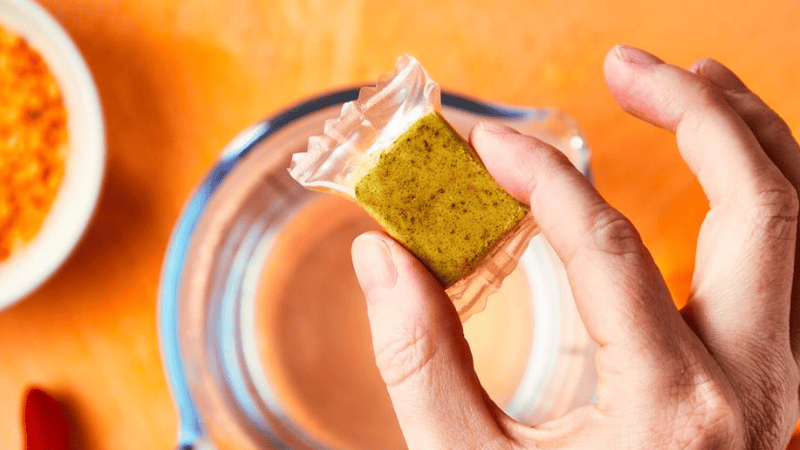
Edible packaging is precisely what it sounds like: packaging you can eat. It’s a genius solution to the persistent plastic problem, allowing consumers to munch down wrappers guilt-free or compost them easily.
Beyond its primary goal of minimizing environmental impact, this innovative trend also offers a unique touch to your brand.
Crafting edible packaging involves a blend of science and innovation, creating protective solutions that are both functional and sustainable.
The process begins with carefully selecting edible ingredients, typically natural materials that provide the necessary structural integrity and safety.
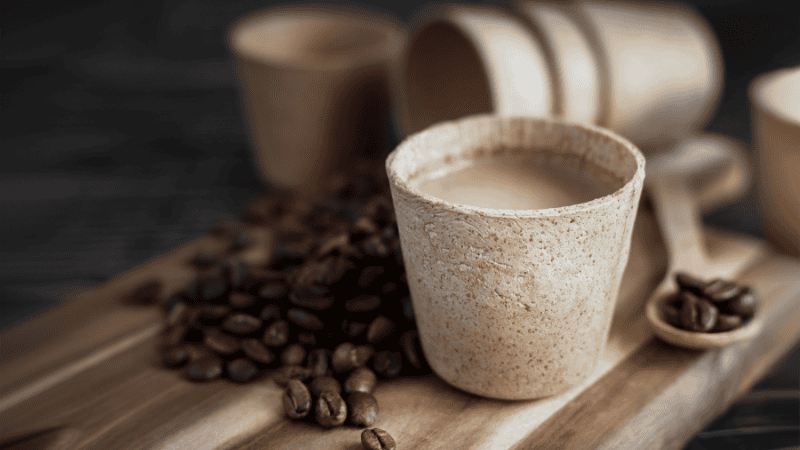
To better understand the foundation of these groundbreaking materials, here are some common edible ingredients used in their creation:
| Edible Ingredient | Common Application/Characteristic |
|---|---|
| Seaweed | Often used for films and coatings; provides good barrier properties and is highly sustainable. |
| Potato Starch | Versatile for various forms, including films and molded packaging; offers a neutral taste. |
| Fruit Pulp | Utilized for films and coatings, especially those with natural flavors or colors; contributes to biodegradability. |
Once the chosen ingredients are selected, they are meticulously mixed to form various shapes, which are then dried to solidify them into sturdy, usable packaging.
This straightforward yet innovative process is indeed shaping what many are calling the future of sustainable food packaging.
Examples of Edible Packaging
We’ve highlighted some of the most well-known examples of edible packaging that provide exciting possibilities for eco-friendly solutions in the food industry. Check them out:
1. Edible Straws
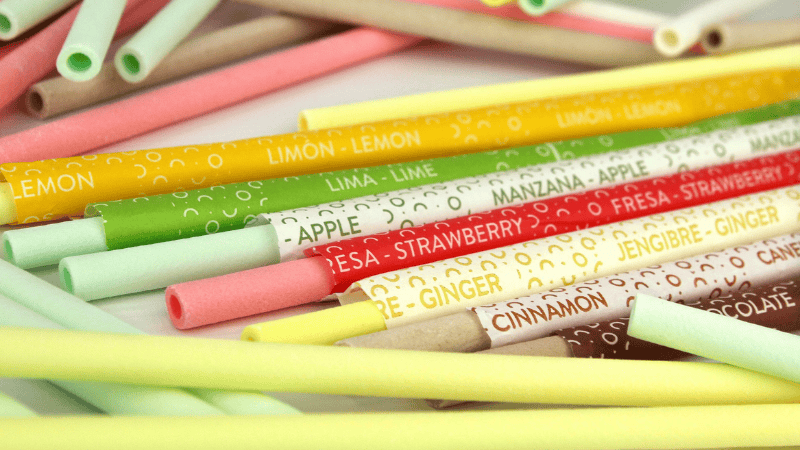
You’re likely aware of traditional plastic straws. I’m talking about those seemingly harmless tubes we use for sipping our drinks. Sadly, there are none.
They harm our environment, as most of these straws take centuries to decompose. Traditional straws pollute our oceans, harm wildlife, and clog up landfills.
For this and other reasons, many businesses are turning to edible straws. This brilliant alternative serves the same purpose as their plastic counterparts but with a twist. You can eat them. The same goes for edible plastic wrap and other edible wrappers.
2. Edible Coffee Cups
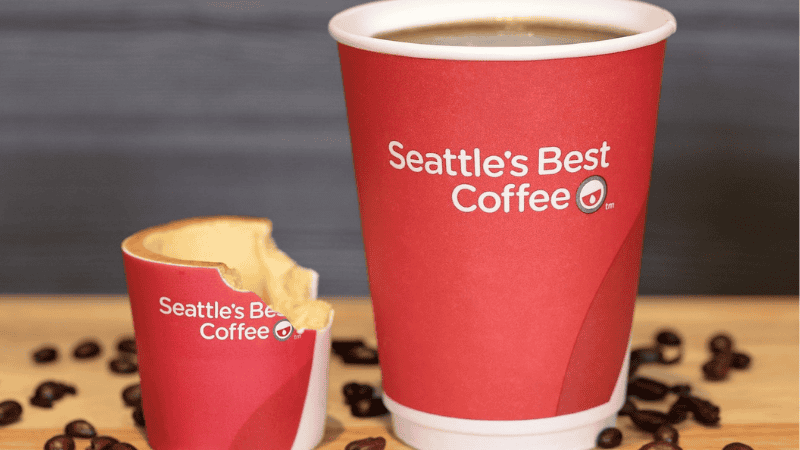
Edible coffee cups present another unique solution to the waste problem plaguing the packaging industry. They are made from seaweed, rice, or other edible materials to create safe-to-eat coffee packaging.
Just like edible straws, these coffee cups reduce plastic waste and also offer an eco-friendly experience to consumers.
So, your customers don’t have to worry about disposing of the cups after drinking their coffee. This has been the main disadvantage of disposable coffee cups, as they end up in landfills or pollute our oceans. Your business can change this, one cup at a time.
3. Edible Spoons
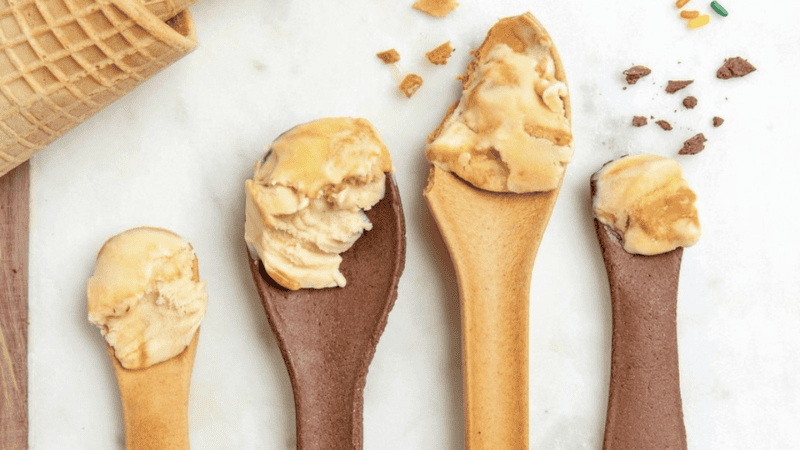
Spoons are common utensils in kitchens, but have you thought about how they harm the environment? Traditional spoons contribute to the ever-growing waste crisis. They take hundreds of years to decompose. Therefore, these spoons also harm ecosystems.
Edible spoons are a sustainable alternative that many brands now use to reduce the dangers of traditional spoons to the environment.
Basically, these spoons are entirely edible and biodegradable. Unlike their plastic counterparts, they break down quickly with no residue.
4. Eco-bags
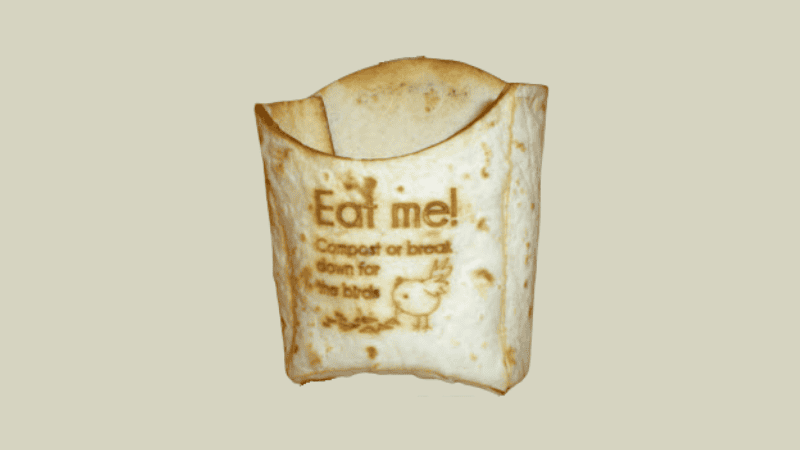
Edible packaging is slowly changing packaging as we know it. Especially everyday essentials like bags. You know how ubiquitous bags are. They’re everywhere, from grocery stores to takeout joints.
Unfortunately, they are not as safe as we think they are. For example, plastic bags are not biodegradable even after 1,000 years. Instead, these packaging materials break down into smaller parts that continue to harm the environment.
That’s why many businesses have turned to edible packaging materials, such as plant starches or cellulose, to make eco-bags for packaging. Unlike plastics that linger for centuries, these bags break down naturally into harmless substances. This means cleaner streets, healthier ecosystems, and a happier planet for all.
These reusable bags are not harmful to Marine life and are edible.
Eco-bags are versatile, too. You can customize them with your brand logo or message. It is a smart way to turn every carry-out into a subtle marketing opportunity.
Why You Should Consider Edible Packaging for Your Business
The following are the reasons businesses are turning to edible packaging: go through them to see whether you should join this smart packaging movement or not.
1. Good for the Planet
Here is a not-so-fun reality of traditional packaging. Think about all those plastic wrappers, styrofoam containers, and cardboard boxes. They all have one thing in common. These materials pile up in landfills. Others decompose after a few years. Some don’t.
But edible packaging takes a different approach. Instead of creating more waste, it offers a sustainable alternative. This edible packaging material is fully biodegradable. It means no more worrying about plastic pollution or even overflowing landfills.
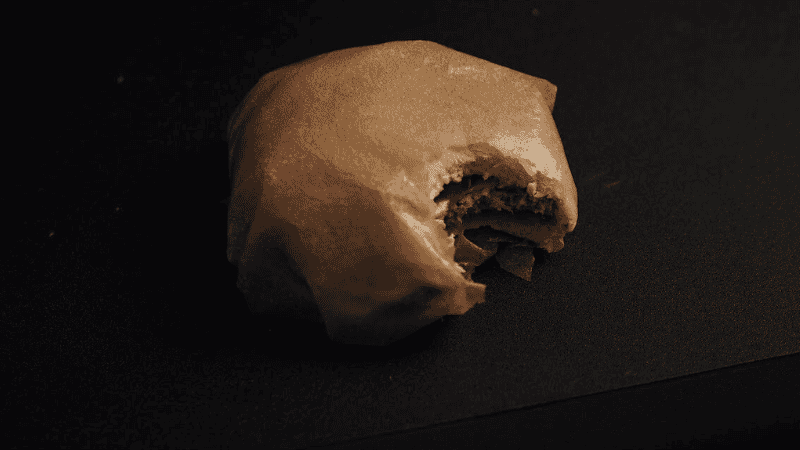
Edible food packaging also helps cut down on carbon emissions. Here’s the thing: Producing traditional packaging requires a lot of energy. Much of this comes from fossil fuels. So, if you switch to edible options, then you are supporting greener production methods.
2. Popular with Customers
Plastics or any other traditional packaging methods are a big turn-off for eco-conscious consumers. Many shoppers today are keenly aware of the environmental impact of their purchases. So, when they see excessive packaging waste, it usually makes them hesitate before buying.
However, edible packaging flips the script. It aims to solve the world’s plastic problem. Think about it:
Your customers won’t just be throwing away packaging. They’ll be eating it. This approach aligns perfectly with the values of today’s consumers. Because customers can simply consume the packaging along with the product, edible packaging makes your offerings appealing to modern lifestyles.
3. Works for Many Products
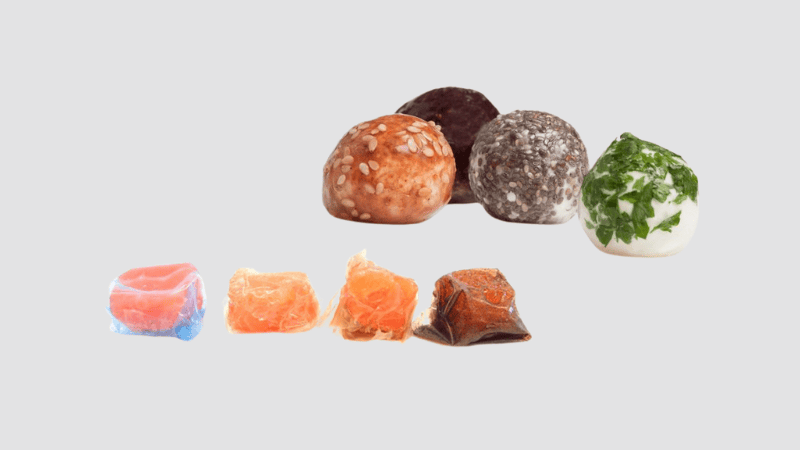
This innovative packaging isn’t limited to just one type of item. Edible packaging can work wonders for your brand. Whatever you sell, be it snacks, beverages, or even personal care products.
The versatility is further made possible by the use of edible films derived from natural sources such as seaweed, fruits, and vegetables. As the materials are safe for consumption and are biodegradable, they perfectly address concerns about environmental sustainability.
Therefore, versatility is one reason you should consider edible packaging for your business. This is because of their ability to cater to the diverse needs of your product lineup.
4. Unique Marketing Opportunity
Marketing today is more about engaging your customers in memorable experiences. And what could be more engaging than packaging that they can eat? Your product comes wrapped in a biodegradable, edible layer that leaves a memorable taste in your customers’ mouths.
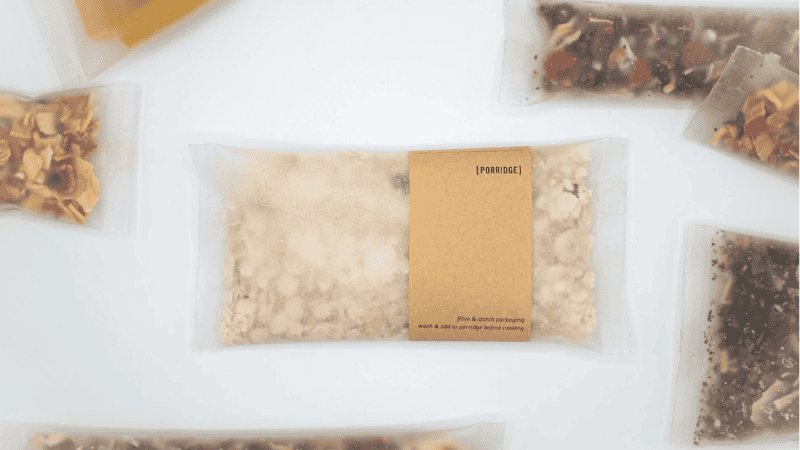
In short, edible packaging sells an adventure, not just the product. Also, this type of packaging is a blank canvas, limited only by your creativity. You can:
- Infuse it with flavors that complement your product
- Imprint it with your logo, or even
- Embed messages that surprise or delight.
5. Safe and Healthy
Poor packaging choices can lead to diseases and health risks for consumers. They risk consuming harmful chemicals, as these can easily leach into food, and the consequences are usually dire.
So, using packaging solutions made from materials such as seaweed, starches, or proteins to safeguard your products is a clever way to ensure the health of your customers.
Edible packaging is a barrier against contaminants while being completely safe for consumption. It eliminates the need for single-use plastics and reduces waste. Moreover, this modern packaging ticks all the boxes for eco-conscious consumers.
6. Save Money Over Time
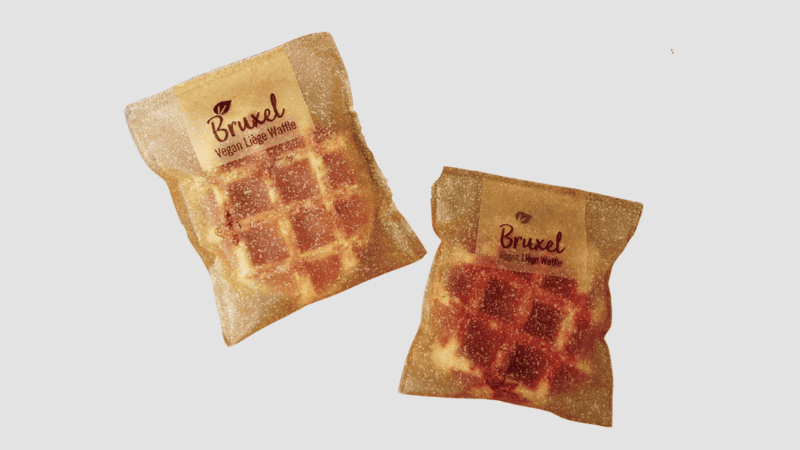
Traditional packaging materials, such as plastics or cardboard, incur costs both in production and disposal. However, with edible packaging, you’re not just buying a wrapper; you’re also buying a snack.
As we have discussed, these wrappers are often made from natural ingredients, which are cheaper and more sustainable than traditional materials.
Plus, they are usually biodegradable, so you don’t have to worry about paying for expensive waste disposal. Because edible packaging is designed to be eaten, there’s less food waste overall.
No more throwing away half-eaten snacks, mostly due to too hard or messy wrappers. Other than saving you money, this can also earn you money. It’s a unique selling point that sets you apart from the competition.
7. Meets Regulations
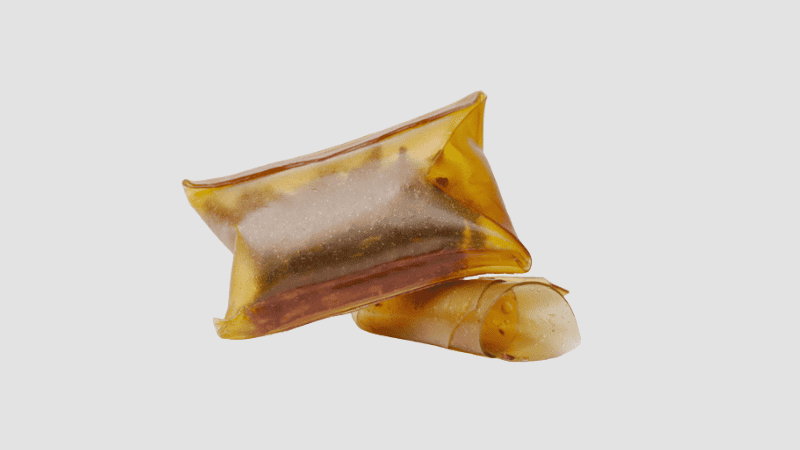
Most countries now focus on reducing waste when it comes to packaging materials. The regulations dictate that packaging must be safe for consumption, environmentally friendly, and sustainable. Edible packaging ticks all the right boxes here. It meets regulations.
These edible materials are made from natural, food-grade ingredients. This way, they pose no harm to consumers.
8 Other Environmentally Friendly Food Packaging Material Options
While edible packaging is becoming popular for its eco-friendly qualities, there are numerous other environmentally friendly options you can turn to outside the edible packaging market. Here are the most common ones:
1. Recycled Paper and Cardboard
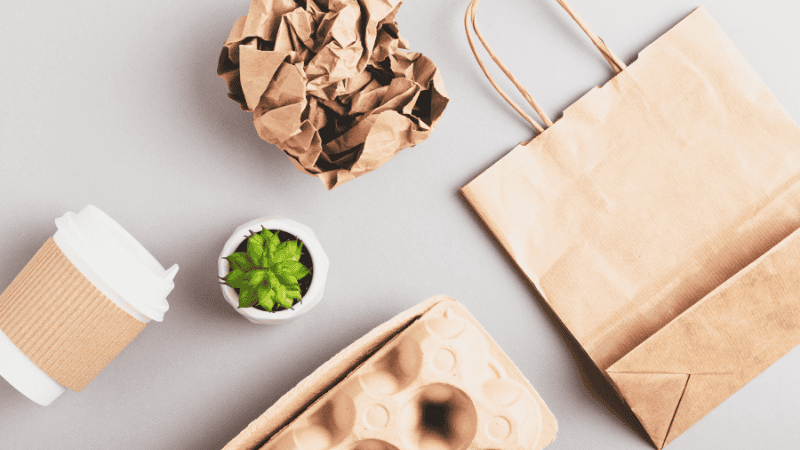
Recycled paper and cardboard (such as Kraft paper) are popular choices for eco-friendly packaging. They mostly come from post-consumer waste and other recycled materials. So they cut down waste in landfills.
These packaging solutions are cost-effective, widely available, and easy to customize or brand. They also send a strong message about your commitment to sustainability.
However,
There are limitations you must consider:
- They are less durable than other materials
- These materials are less suitable for wet or oily foods unless treated with extra coatings.
Despite these challenges, recycled paper and cardboard continue to offer practical and sustainable packaging solutions for many businesses.
2. Aluminum Packaging
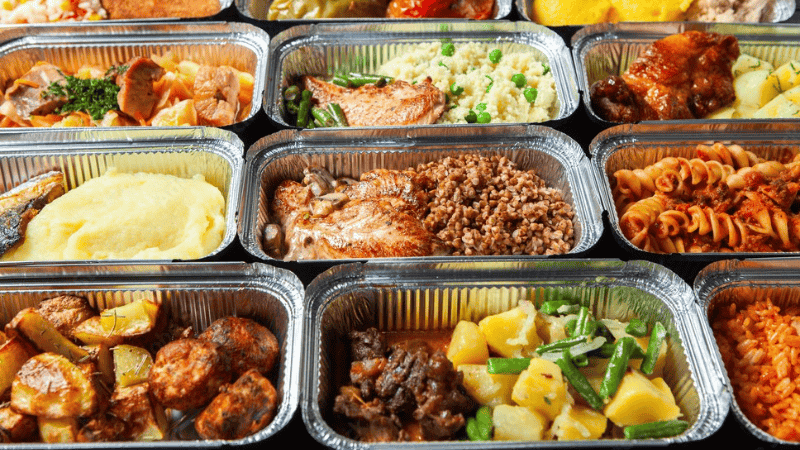
Aluminum packaging is a strong, lightweight option for food products. It provides an effective barrier against light oxygen and moisture. This keeps food fresh and safe. But why is this one of the most used food packaging materials?
Aluminum is popular for its ability to protect food. Its corrosion resistance further ensures the food inside remains uncontaminated. And you don’t have to worry. This packaging material is versatile enough that you can use it for both hot and cold foods.
But aluminum packaging isn’t without limitations. The production is energy-intensive. This can be a drawback, especially if your business goal is to minimize your carbon footprint.
Also, while aluminum is recyclable, not all recycling facilities accept it. This may 100% limit your sustainability efforts.
3. Plant-Based Plastics
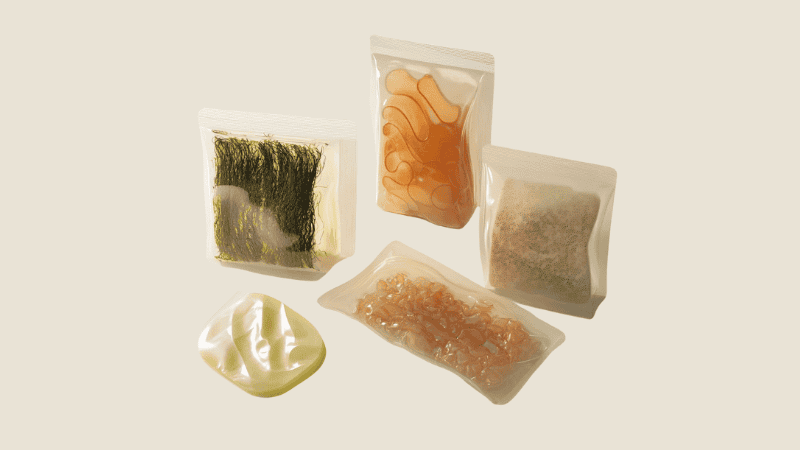
Some brands know them as bioplastics. But both terms refer to packaging materials made from renewable resources like cornstarch, sugarcane, and potatoes. These materials offer an eco-friendly alternative to traditional petroleum-based plastics.
Most importantly, plant-based plastics reduce reliance on fossil fuels and often have a lower carbon footprint during production. They break down more easily in natural environments compared to conventional plastics. This is how they reduce the impact on landfills and marine life.
So, what are the limitations of plant-based plastics? The only two things you must think about before using these packaging materials are production and disposal. Their production still requires energy, and not all facilities can compost them efficiently.
Secondly, inconsistent disposal methods may lead to these materials ending up in regular waste streams. Here, they might not degrade as intended.
4. Biodegradable Plastics
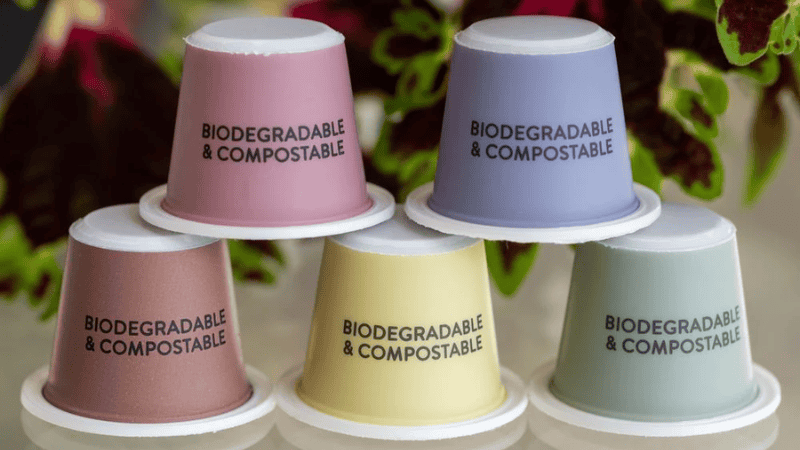
Biodegradable plastics are an exciting step forward in sustainable packaging. These are made from materials that break down more easily in the environment compared to traditional options. They offer a way to maintain the convenience and durability of plastic while addressing environmental concerns.
Customers increasingly favor companies that demonstrate a commitment to sustainability. So, using biodegradable plastics may boost your brand’s reputation as an eco-conscious choice.
5. Mushroom Packaging
Mushroom packaging is a smart option made from agricultural waste and mycelium. This material is fully biodegradable and compostable. You should consider using it as a sustainable alternative to traditional plastics and Styrofoam.
Other than having a positive environmental impact, mushroom packaging doesn’t cost a lot to produce. You only need readily available products to make them.
But you should know that mushroom packaging is not as widely available as conventional methods. Therefore, production is slower. Its water resistance is also limited. This could be a major drawback, too.
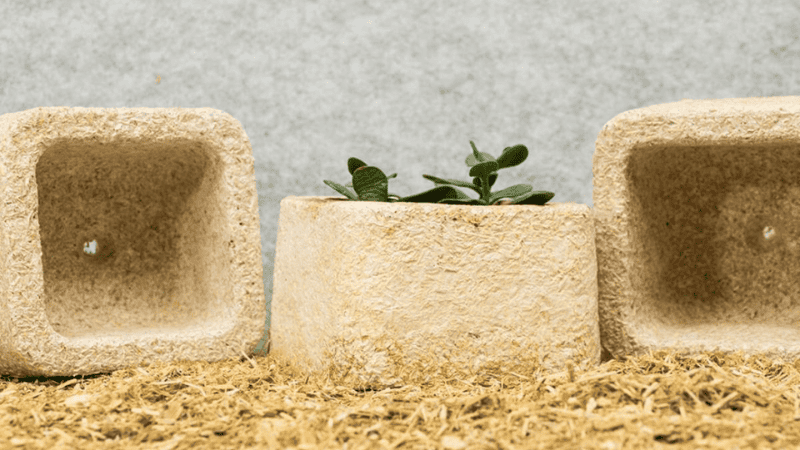
6. Reusable Glass
Here is another smart packaging option. Glass containers can be used repeatedly without losing quality. They are perfect for storing food and beverages because they don’t interact with the contents.
Many businesses use glass to give their products a premium look and feel. These containers can be washed and reused many times.
The limitations of glass packaging include:
- Glass is heavier than plastic, so it may increase shipping costs and make handling more challenging.
- There is a higher risk of breakage during transportation and use. This may make you consider packaging solutions that minimize breakage.
7. Compostable Films and Bags
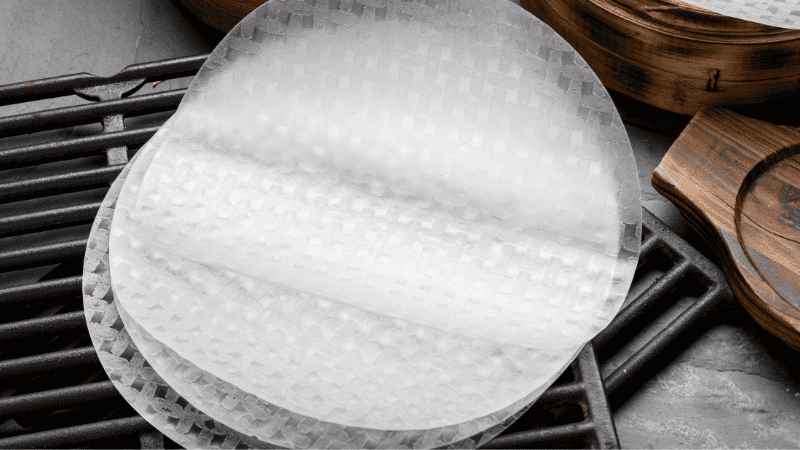
Compostable films and bags are made from natural materials like corn starch, cellulose, or potato starch. This food packaging film and bags break down into organic matter under composting conditions. You can use compostable films and bags for various food items, from fresh produce to snacks.
Many businesses choose these options because they reduce environmental impact. As they decompose, compostable films and bags don’t leave harmful residues, unlike regular plastic. This not only helps reduce landfill waste but also supports your brand’s commitment to sustainability.
However, you should note some limitations. Compostable packaging often requires specific composting conditions to break down effectively. This means they may not decompose properly if thrown in regular trash.
Also, they can be more expensive than traditional plastics, which might impact your packaging budget. Their shelf life and durability can sometimes be shorter compared to conventional materials.
8. Beeswax Wraps
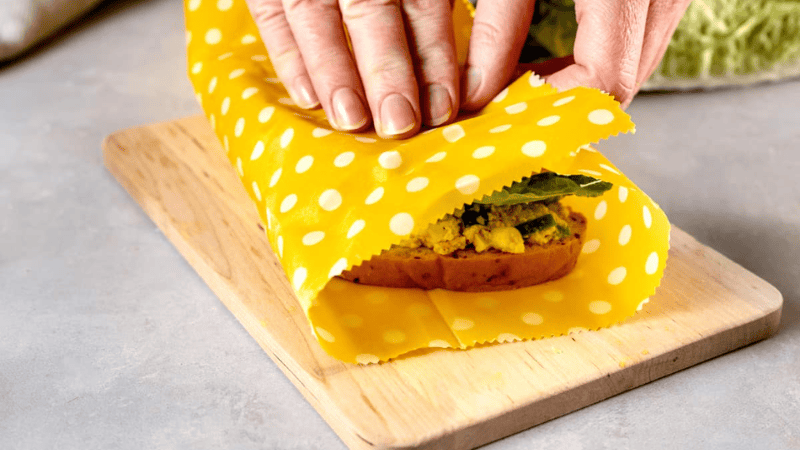
This type of packaging is cotton infused with beeswax or tree resin. They can be used to cover bowls, wrap sandwiches, and keep fruits and vegetables fresh.
Just like the other options on this list, Beeswax wraps are reusable and biodegradable. Unlike single-use plastics, you can wash and reuse them for up to a year. This reduces waste and also saves you money.
There are a few things to consider. Beeswax wraps are not suitable for wrapping raw meat due to hygiene concerns. They also need to be kept away from heat, as high temperatures can cause the wax to melt.
FAQs
Q1: What exactly is edible packaging?
Edible packaging is a type of food packaging made from natural, food-grade materials that can be safely consumed along with the product or composted.
Q2: What are edible packaging materials made from?
Edible packaging is typically made from natural, biodegradable ingredients such as seaweed, potato starch, fruit pulp, rice, or plant starches.
Q3: Is edible packaging safe to eat?
Yes, edible packaging is designed to be completely safe for consumption, made from food-grade ingredients that are harmless if ingested.
Q4: Does edible packaging taste good?
Edible packaging can be designed to be tasteless or infused with flavors that either complement or enhance the product it contains.
Q5: What types of edible packaging exist?
Examples include edible straws, spoons, coffee cups, and eco-bags.
Conclusion
Edible packaging is a revolutionary step toward a sustainable future. This is a unique way to reduce waste and appeal to eco-conscious customers.
Therefore, you may consider this modern packaging, especially if you want a safe, biodegradable option that is made from natural ingredients. It’s one of the smartest ways to attract more customers today.
Transform Your Packaging With Packoi’s Customized Solutions
Our team at Packoi specializes in designing customized, eco-friendly packaging solutions for businesses like yours. Contact us today, and we’ll help you contribute to a greener tomorrow.



